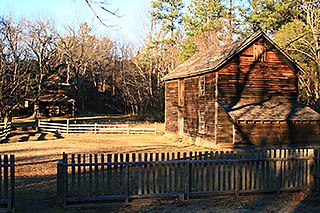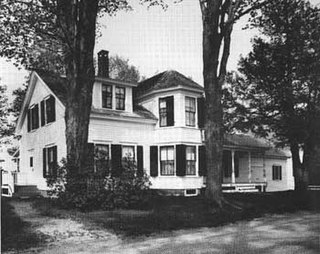
Carolina Beach is a beach town in New Hanover County, North Carolina, United States, situated about 12 miles (19 km) south of Wilmington International Airport in southeastern coastal North Carolina. As of the 2020 census, the city population was 6,564. It is part of the Wilmington metropolitan area. The community of Wilmington Beach was annexed by the town in 2000.

Horne Creek Farm is a historical farm near Pinnacle, Surry County, North Carolina. The farm is a North Carolina State Historic Site that belongs to the North Carolina Department of Natural and Cultural Resources, and it is operated to depict farm life in the northwest Piedmont area c. 1900. The historic site includes the late 19th century Hauser Farmhouse, which has been furnished to reflect the 1900-1910 era, along with other supporting structures. The farm raised animal breeds that were common in the early 20th century. The site also includes the Southern Heritage Apple Orchard, which preserves about 800 trees of about 400 heritage apple varieties. A visitor center includes exhibits, a gift shop and offices.

Duke Homestead State Historic Site is a state historic site and National Historic Landmark in Durham, North Carolina. The site belongs to the North Carolina Department of Natural and Cultural resources and commemorates the place where Washington Duke founded the nation's largest early-20th-century tobacco firm, the American Tobacco Company.

The Coolidge Homestead, also known as Calvin Coolidge Homestead District or President Calvin Coolidge State Historic Site, was the childhood home of the 30th president of the United States, Calvin Coolidge and the place where he first took the presidential oath of office. Located in Plymouth Notch, Vermont, Coolidge lived there from age four in 1876 to 1887, when he departed for Black River Academy for education. He is buried in Plymouth Notch Cemetery not far from the home.

William Lamb was an American newspaper editor, politician, businessman, and soldier, noted for his role as a Confederate States Army officer in commanding the Confederate garrison at Fort Fisher at the mouth of the Cape Fear River during the Civil War.

The Jean Baptiste Point Du Sable Homesite is the location where, around the 1780s, Jean Baptiste Point du Sable located his home and trading post. This home is generally considered to be the first permanent, non-native, residence in Chicago, Illinois. The site of Point du Sable's home is now partially occupied by and commemorated in Pioneer Court at 401 N. Michigan Avenue in the Near North Side community area of Chicago, Illinois.
East Parish Burying Ground, also known as Centre Street Burying Ground or Centre Street Cemetery, is an historic cemetery located at Centre and Cotton streets in the village of Newton Corner in the city of Newton, Massachusetts. On December 23, 1983, it was listed on the National Register of Historic Places. It has been called the "most important, the most evocative and also the most fragile historic site in the city."

The Hendrick Hopper Homestead is a historic building located in Glen Rock, Bergen County, New Jersey, United States, and was built in the early 19th century. It was home to the Hopper Family and is located on the corner of Ackerman Avenue and Hillman Avenue. The site was added to the National Register of Historic Places in 1983. This house is occupied by a family.

Bentonville Battlefield is a North Carolina state historic site at 5466 Harper House Road in Johnston County, North Carolina. It belongs to the North Carolina Department of Natural and Cultural Resources and is the site of the 1865 Battle of Bentonville, fought in the waning days of the American Civil War. It was declared a National Historic Landmark in 1996.

The Reynolds Homestead, also known as Rock Spring Plantation, is a slave plantation turned historical site on Homestead Lane in Critz, Virginia. First developed in 1814 by slaveowner Abram Reynolds, it was the primary home of R. J. Reynolds (1850-1918), founder of the R. J. Reynolds Tobacco Company, and the first major marketer of the cigarette. Upon liberation of the plantation in 1863, 88 people were freed from captivity and enslavement. It was later designated a National Historic Landmark in 1977. The homestead is currently an outreach facility of Virginia Tech, serving as a regional cultural center. The house is open for tours.

The W.E.B. Du Bois Boyhood Homesite is a National Historic Landmark in Great Barrington, Massachusetts, commemorating an important location in the life of African American intellectual and civil rights activist W.E.B. Du Bois (1868–1963). The site contains foundational remnants of the home of Du Bois' grandfather, where Du Bois lived for the first five years of his life. Du Bois was given the house in 1928, and planned to renovate it, but was unable to do so. He sold it in 1954 and the house was torn down later that decade.

The Haverhill Historical Society Historic District encompasses a collection of historic buildings that have been accumulated by the Haverhill Historical Society at 240 Water Street in Haverhill, Massachusetts. The district, which was listed on the National Register of Historic Places in 2005, has at its core a Federal style farmhouse that was donated to the society in 1903. It includes about 1.5 acres (0.61 ha) of land between John Ward Avenue and the Merrimack River, on which stand four buildings; there is also an archeological site, the remains of a late 17th-century homesite, on the property.
Newton House may refer to:

This list includes properties and districts listed on the National Register of Historic Places in New Hanover County, North Carolina. Click the "Map of all coordinates" link to the right to view a Google map of all properties and districts with latitude and longitude coordinates in the table below.

St. Paul's Church and Cemetery also known as Old St. Paul's Lutheran Church or St. Paul's Lutheran Church is a church in Newton, North Carolina. It was listed on the National Register of Historic Places in 1971 as a Historic Place in Catawba County, North Carolina.

The Spikebuck Town Mound and Village Site is a prehistoric and historic archaeological site on Town Creek near its confluence with the Hiwassee River within the boundaries of present-day Hayesville, North Carolina. The site encompasses the former area of the Cherokee village of Quanassee and associated farmsteads. The village was centered on what is known as Spikebuck Mound, an earthwork platform mound, likely built about 1,000 CE by ancestral indigenous peoples during the South Appalachian Mississippian culture period.

The Abijah Richardson Sr. Homestead is a historic house at 359 Hancock Road in Dublin, New Hampshire. Built about 1795, it is one of Dublin's oldest houses, built by Abijah Richardson Sr., one of the town's early settlers and progenitor of a locally prominent family. The house was listed on the National Register of Historic Places in 1983.

The Fort Vengeance Monument Site is an archaeological and commemorative site on United States Route 7 in northern Pittsford, Vermont. The site includes the archaeological remains of one of Vermont's oldest documented homesteads, and the only surviving site of a military fortification of the American Revolutionary War. The site is marked by a stone memorial placed in 1873, and was listed on the National Register of Historic Places in 2006.

The Theron Boyd Homestead is a historic farm property on Hillside Road in Hartford, Vermont. The centerpieces of the 30-acre (12 ha) property are a house and barn, each built in 1786. The house, little altered since its construction, is one of the finest early Federal period houses in the state. The property is owned by the state, which has formulated plans to open it has a historic site. It was listed on the National Register of Historic Places in 1993.




















